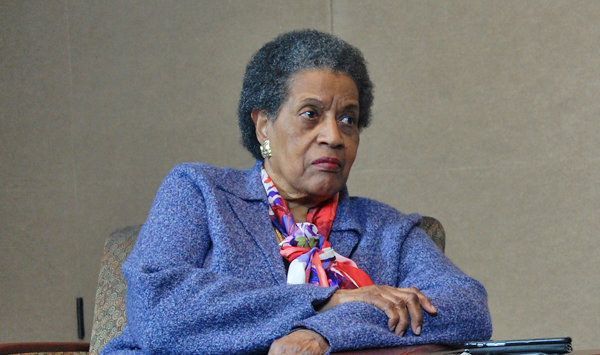
Myrlie Evers-Williams, 83, entered the history books as the widow of slain civil rights leader Medgar Evers, but that was far from the end of her story. Evers-Williams had worked closely with her husband, who was field secretary for the NAACP in Mississippi. After he was murdered in their front yard, she moved to California, earned a college degree and worked in civil rights in academia and business. In 1995, she helped a struggling NAACP overcome financial problems as the first woman to chair the organization. Jan. 16, Evers-Williams spoke at the 32nd annual Martin Luther King Jr. Holiday Luncheon at the Lansing Center. Then she sat down for an interview with City Pulse publisher and editor Berl Schwartz for the “City Pulse Newsmakers” TV show. Here are edited and condensed excerpts in honor of the first day of Black History Month.
You said in your talk that you met on occasion with Coretta Scott King and Betty Shabazz — and that you even found things to laugh about.
We certainly discussed our husbands, Martin Luther King Jr., Medgar and Malcolm. That was done with thought, but it was also done with a lot of laughter, because we could discuss the way our husbands reacted and what they did in certain cases. Race, hatred and what not.
If you don’t find some humor in life, it becomes very difficult. There were times not only did we discuss those issues, we’d have heated arguments about it, we’d end up shedding tears and then embracing each other because it was a uniqueness in our relationship. It was so precious to all three of us. Coretta Scott King knew that her husband would probably be assassinated. I certainly had known that Medgar would be assassinated.
The year before your husband was assassinated, your home was fire bombed. Certainly that had to be a warning of what might come.
There were warnings all along. You simply did not challenge a political system without knowing that there were be some effect because of it. Political systems represent power; no one wants to relinquish power. How do you work together to build a coalition that addresses the needs, expectations and hopes of everyone involved? That really is a difficult thing to do. Here in America, we’ve been able to move forward in that in a way. I still believe that our discussions and exchanges perhaps are not rare, but they are so decent and so good. You and I could disagree on something from today ‘til the end of the earth, but as long as we did it with respect for each other, it’s all right.
Is that a problem you think with our president-elect? That he can’t disagree with respect?
I think respect is a big problem with the president-elect. It appears, in my humble estimation, in every facet of his political career.
Going back then to when your husband was assassinated, you weren’t surprised, but obviously it changed your life in unfathomable ways. How did you pick yourself up? How did you keep going at that point?
Bit by bit. Hope, faith, help from friends regardless of race, creed or color. Also another motivating factor is the ugly negative-ness that you find. It makes you stand tall and brace your back and reach a little where you say to others, “Come on. I’m ready for the fight.”
Before the assassination, after the fire bombing of your home the year before, was there any thought of "We’re risking our lives, we’re risking our children’s lives?"
Of course. Of course.
What were those discussions like?
Medgar and I were very emotional about the possibility of his being killed. One of the last things he said to me was, and I quote, “You take care of my children.” I’ll never forget that. That was the night before he was killed. “You take care of my children.” I recall saying to him, “Of course I’ll take care of your children. They are my children too.” I’ve been very fortunate to have been able to embrace those three young people to educate them, and I hope I’ve given them good background as human beings.
You said in your talk you’re thankful for all of the things that have happened in your life, including the ones that have been very difficult. Is that something you had to grow into as you look back on your life, or have you always had that sort of approach?
I don’t think I’ve always had those feelings. I think it’s something that I’ve grown into. You mature, you are able to see things a little bit differently. I’ve been very, very fortunate in my life. It’s been very painful, but it’s also been very good. You hopefully grow from all of these things that are there. You look at the changes. For me, I tried to find a place that I might be helpful. Helpful, not negative. That’s life. That’s life. Do you embrace it? I embrace it regardless of what it is. If it’s so negative it makes me angry or what not, I have on a couple of occasions said, “Come on. I’m here. Come on.”
Myrlie Evers-Williams' interview with Berl Schwartz for the “City Pulse Newsmakers” TV show is is available at www.lansingcitypulse.com and will air will air at 10:30 a.m. Saturday on My18. An advertisement in this week's print issue erroneously stated that an interview with retired WLNS 6 news anchor Jane Aldrich would air Saturday. The interview with Aldrich will air Feb. 11.
Support City Pulse - Donate Today!
Comments
No comments on this item Please log in to comment by clicking here